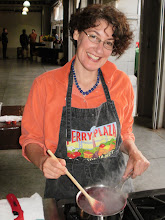What's on the menu? Scones that don't suck! I am a lover of scones, and yet I almost never eat them outside of my own kitchen, because almost all commercial scones, particularly the ones you get a chain coffee shop like Peets or Starbucks, are AWFUL: dense, tasteless hockey pucks that aren't even good for you. At least those equally dense & tasteless little oatcakes on the countertop of every Berkeley coffee joint are redeemed by Swiffering your colon with all the fiber in there.
But it doesn't have to be that way. Like chocolate chip cookies, which are infinitely better when made at home from the recipe on the back of the chip bag (although, picky picky, I like Guittard or Ghirardelli's dark chocolate chips a million times more than the overly sweet & metallic Nestle ones), excellent scones are easy to make. The recipe I rely on is an adaptation of one from a basic British cookbook that I took out of the library in, oh, 1981 or so, in order to make scones as part of a welcome party my school was hosting for a new English exchange student. I probably had a little crush on this guy, who was several years older, wore a long knitted scarf, and had, of course, That Accent.
Now, about the egg: most British scone recipes don't call for an egg--they're basically flour, sugar, leavening, butter, and buttermilk, milk, or cream. But I'm up here with all the chickens, rolling in eggs, and I've found that adding an egg does make for a lighter, fluffier scone that's a wee bit more cakelike, so it holds together nicely when you split it open to make way for all the jam. It's really optional, though, and you can make these quite nicely with or without it.
You can also mix up the flours--I usually use a mixture of whole-wheat pastry flour and all-purpose white, but you could also try non-wheat flours like oat or barley. (I've found a mix of oat & barley flours to be a good substitute for regular wheat flour in quick breads like this one.)
Now, some troubleshooting: don't worry if you add in all the liquid and get a very sticky or mushy dough. Just skip the folding/patting/cutting step, and drop your scones off a big spoon onto the baking sheet in nice big lumps. These are drop scones, perfectly legit.
Feel free, as I know you will, to mess around with what you put in the scones. Currants and lemon rind, cranberries and orange rind, pecans or almonds and chocolate chips, golden raisins, whatever you like.
Apricot-Candied Citrus Scones
Makes 16 scones, depending on size
3 cups flour (I like to use a mixture of whole-wheat and white)
2 tsp baking powder
1/2 tsp baking soda
1/2 tsp salt
1/3 cup sugar
6 oz butter (1 stick + 4 tbsp) butter, cold and cut into cubes
2 tbsp finely chopped candied lemon or orange rind*
1 cup plain yogurt
¼ cup half-and-half or heavy cream
1 egg, preferably from a pastured hen
½ cup diced dried apricots
2 tbsp milk or cream, for glazing
1 tbsp sugar, for finishing
Preheat oven to 425F. In a large bowl, sift dry ingredients together. Add butter cubes, tossing them around with your fingers or a fork until each cube is covered in flour. Keep tossing mixture lightly and cutting butter cubes down smaller and smaller, until mixture looks pebbly. Quickly toss in chopped citrus rind.
Beat egg, yogurt, and cream together. Drizzle most, but not all, of yogurt mixture over flour-butter mixture. Grab that fork and start tossing again, scooping up from the bottom so that the whole bowlful gets evenly moistened. Mix in diced apricots.
Dump out your big, rather straggly lump of dough onto a clean countertop. Pat down gently into a round. Fold over, then pat down again 2 or 3 times, just until it smooths out and holds together. Pat into a round about an inch thick.
Cut in rounds or wedges, using a sharp knife or a biscuit cutter. Line a baking sheet with parchment paper or grease lightly. Place scones on prepared sheet. Brush top of each scone with a little milk or cream. Sprinkle with a little sugar.
Bake 15-20 minutes, until golden brown. Remove from baking sheet and cool on a rack. Serve warm with citrus curd or jam.
*Candied citrus rinds are available in the market from June Taylor Jams.

No comments:
Post a Comment